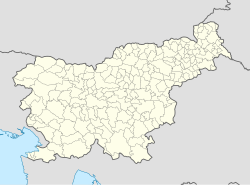Male Rodne (pronounced [ˈmaːlɛ ˈɾoːdnɛ]) is a settlement in the Municipality of Rogaška Slatina in eastern Slovenia. The entire area belongs to the traditional Styria region and is now included in the Savinja Statistical Region.[2]
Male Rodne
Sveti Mohor (until 1953) | |
|---|---|
| Coordinates: 46°13′54.49″N 15°36′3.35″E / 46.2318028°N 15.6009306°E | |
| Country | |
| Traditional region | Styria |
| Statistical region | Savinja |
| Municipality | Rogaška Slatina |
| Area | |
• Total | 1.46 km2 (0.56 sq mi) |
| Elevation | 326 m (1,070 ft) |
| Population (2002) | |
• Total | 118 |
| [1] | |
Name
editThe name of the settlement was changed from Sveti Mohor (literally, 'Saint Hermagoras') to Male Rodne (literally, 'little Rodne') in 1953.[3][4] The name was changed on the basis of the 1948 Law on Names of Settlements and Designations of Squares, Streets, and Buildings as part of efforts by Slovenia's postwar communist government to remove religious elements from toponyms.[5][6] The name Male Rodne ('little Rodne') distinguishes the settlement from nearby Velike Rodne ('big Rodne'). The plural name Rodne and names like it (e.g., Rodine) are derived from the common noun *rodina 'untilled land', thus referring to a local geographical feature.[7]
Church
editThe local church is dedicated to Saints Hermagoras and Fortunatus and belongs to the Parish of Rogaška Slatina. The Late Gothic sanctuary dates to 1536 and has a painted stellar vaulted ceiling. The nave dates to the 17th century and a southern chapel was added in 1740.[8]
References
edit- ^ Statistical Office of the Republic of Slovenia
- ^ Rogaška Slatina municipal site
- ^ Marinković, Dragan (1991). Abecedni spisak naselja u SFRJ. Promene u sastavu i nazivima naselja za period 1948–1990. Belgrade: Savezni zavod za statistiku. pp. 62, 101.
- ^ Spremembe naselij 1948–95. 1996. Database. Ljubljana: Geografski inštitut ZRC SAZU, DZS.
- ^ Premk, F. 2004. Slovenska versko-krščanska terminologija v zemljepisnih imenih in spremembe za čas 1921–1967/68. Besedoslovne lastnosti slovenskega jezika: slovenska zemljepisna imena. Ljubljana: Slavistično društvo Slovenije, pp. 113–132.
- ^ Urbanc, Mimi, & Matej Gabrovec. 2005. Krajevna imena: poligon za dokazovanje moči in odraz lokalne identitete. Geografski vestnik 77(2): 25–43.
- ^ Snoj, Marko (2009). Etimološki slovar slovenskih zemljepisnih imen. Ljubljana: Modrijan. pp. 357–358.
- ^ Slovenian Ministry of Culture register of national heritage reference number 3083
External links
edit
